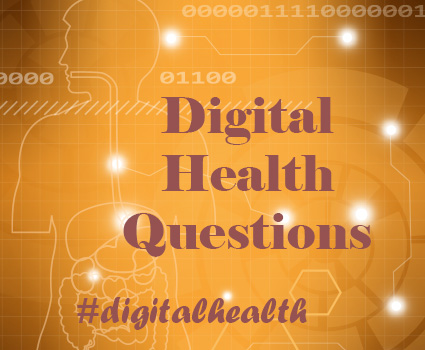Your cart is currently empty!

Digital Health Questions
Digital health is one of the most exciting new frontiers, generating thrills and chills for startups and deep trepidation for health care professionals.
The episode on Grey’s Anatomy that poses the scintillating question, “What the hell is a twitter?” provides a dramatic illustration of the degree to which digital media is becoming a natural part of health care along with everything else in our world… and the degree to which that makes people uncomfortable.
As operations are live-tweeted as a teaching tool, the Chief of Surgery is outraged at the possible legal vulnerability that creates for the hospital. The legal vulnerability may not be unrealistic, but we’re using Twitter at work, in the classroom, in church, and of course also in the hospital. And while many (possibly most) of the teachers in the department where I teach make their students turn off their cell phone, just as the Chief of Surgery in this episode wants to, we can’t really un-ring that bell.
Digital media is part of our lives, and digital health is part of the present and the future of health care.
Digital health covers a lot of territory:
- Websites for medical professionals allow patients to get information, refill prescriptions, and book appointments.
- Health communication and collaboration apps — some as simple as Twitter or a CRM, some dauntingly complex and specialized — allow health care providers to work together.
- The Quantified Self movement encourages people to track their sleep, their steps, their eating, their hormones… Wearables make this easier.
- Apps for diabetes management allow sufferers to track and manage blood sugar, meals, moods, and more.
- Social media education lets doctors connect with patients and provide authoritative information that cuts through the misinformation.
- New digital packaging for medications can remind patients to take their medicine and to refill their prescriptions.
- Google can track emergent flu outbreaks by the places where people start Googling the flu. The potential is impressive.
But there are some big questions. One of the biggest questions, arguably, is how to get busy health care providers up to speed on the technology. The government had a giant project to get health care providers to use electronic health records gradually over a period of years, complete with financial incentives and huge amounts of support… and most American health care facilities are still struggling.
But before they get on board, healthcare providers and healthcare consumers need answers to a couple of other big questions:
- What do we do with the collected data? On the one hand, we’re talking about amazingly valuable data that has the potential to propel medical knowledge forward. On the other hand, we’re talking about very sensitive, personal data that some people don’t want to share… or at least not until they know how it will be used. Should companies like Apple, mySugr, and Fitbit make the decisions on this point?
- How do we help patients make best use of the data? A physician caller at Science Friday pointed out that a patient with full access to his or her own data still doesn’t have the medical knowledge and experience to know just what it means. We see that with web analytics data — people get both unnecessarily worried and unreasonably excited about numbers they see in their Google Analytics. It’s bound to be even more of an issue with people’s health.
These issues are arguably just part of the larger problem of big data. Some healthcare data is actually being collected right now in Retail Link and similar POS systems in the form of sales of pregnancy tests and prescriptions. Plenty is in U.S. Census data. It’s all flowing into enormous collections of information and being used, misused, and left unused along with favorite colors for cars and how often people buy diapers and beer in the same shopping cart.
There’s also the question of where the focus for digital health should be.
“Most of the “health” apps available to date are for those who are healthy,” complains a Huffington Post columnist. This isn’t necessarily a bad thing. Preventive medicine may not have the same emotional appeal as cures for conditions that make people suffer, but it probably has greater potential for making a difference in public health over the long run.
But the column goes on to point out that apps for people with medical conditions are downloaded and not used. Patient compliance is one of the major challenges in most aspects of health care. The Journal of the American Medical Association points out that wearable devices, possibly the most effective approach for getting people to use available digital health tools, are currently in use by some 1-2% of the population, and the users are typically younger, more affluent, and more likely to be motivated to care for their own health anyway.
Statistically speaking, this is still the most common digital health scenario: patients google their symptoms and read an average of 10 sources over a couple of weeks, then visit their doctor (often with printouts from their web research which, surveyes say, irritate their doctors), get verbal instructions and a prescription on paper, and follow up that visit with a review of the health care facility.
That’s not the vision of digital health most of us have. Answering the big digital health questions may be the first step toward moving toward that grander vision.
by
Tags:

Leave a Reply